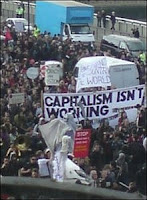 The G20 Summit has just begun, so I would like to take the day to discuss it.
The G20 Summit has just begun, so I would like to take the day to discuss it.First, I would like to give some background information on the G20. In simple terms, the G20 is an enormous conference centered around economic issues. The “20” in G20 refers to the 20 nations that make it up. These include the US, most of the EU, Japan, Brazil, Russia, and Argentina, among others. Obviously because of the pressing economic situation, the G20 is probably going to determine how quickly we can resolve this financial crisis.

Next, I would like to talk about the protests surrounding the event. I can’t think of the last time I have seen such controversy and violence surrounding a political event—protesters have stormed banks, pitched tents, damaged financial buildings, and fought with London police. The protestors consist of various factions, from environmentalists to anti-capitalists, but most are probably just people who are angry at financial institutions. Some have called on people to “lay siege” to banks and other buildings. Overall, I am amazed at this wave of angry populism. Though I knew the event would be shrouded with controversy, I certainly did not expect large-scale riots. However, I doubt that these protests will have any bearing on the results of the conference, but they are an interesting litmus test of the economic climate. As Barack Obama put it, they instill a “sense of urgency” in the G20 leaders, reminding them how important this summit is.
Also, I would like to talk about what is going on at the summit. As you may have already heard, France is adamantly demanding extremely strict economic regulation. As of a few hours ago, Germany has sided with France; the German Prime Minister is also calling for strict regulation of international trade. However, a second faction has emerged: the UK and US are both demanding heavy government spending. I do not believe that these groups are going to divide the G20 and bog it down—France and Germany’s goal is certainly compatible with the United Kingdom and the US’s. Instead, I think that these two groups are going to be the ones who influence the final agreement the most. What come out of the G20 will probably have both heavy regulation and heavy spending.

Also, one of the main focuses of the G20 is probably going to be the IMF, the International Monetary Fund. The IMF will probably have its funds increased dramatically as a result of the G20, and they will probably be given more control over trade as well. The IMF has often come under criticism, since many believe that it disregards human rights concerns and manipulates the world economy. It is true that the IMF is not hostile towards dictatorships, but claims of conspiracy are probably unfounded.
Overall, I support the G20 and believe that it will bring results. Hopefully the summit can also stem the wave of angry populism banging on its doors. Even if the treaties and agreements signed at G20 have little effect on the global recession, the conference may be able to restore consumer confidence. One thing is very clear, though: this is the end of capitalism as we know it. The system that will emerge from G20 will be similar but not the same as the system we use now. Regulation and government spending will be increased, and government will have an enormous role in globalization. Is it for the best? Only time will tell.
I will probably write about the G20 again, most likely after it ends.

No comments:
Post a Comment